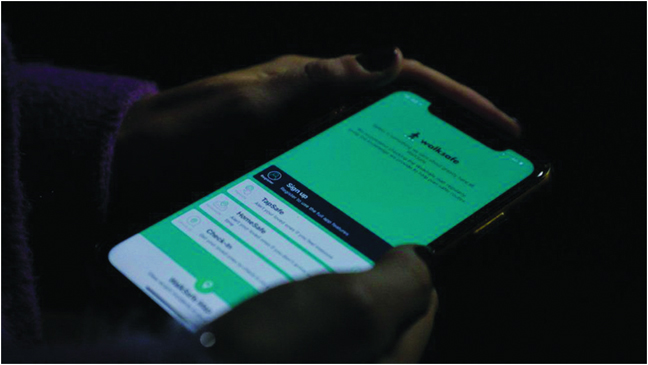
They might call a friend, share their location on WhatsApp, or have their keys to hand – all strategies to stay secure. Sexual harassment against females has been under the spotlight for most of this year, with women across the UK turning to their own methods to feel better when they are out at night. So could technology play a role in making women feel safer on our streets?
Since the murders of Sarah Everard and Sabina Nessa, the WalkSafe app has had a surge in popularity, and is now the fastest-growing safety app in the UK.
Founder Emma Kaye came up with the concept after experiencing harassment, groping and flashing.
“Our app is really bitter-sweet because, of course, we love that we’re busy. However, we really wish it didn’t have to exist. No-one wants to live in a world where we need a safety app, but sadly there is a place for it,” she said.
WalkSafe will have a new sat-nav feature coming early next year, which will include a live map where your family and friends will be able to track your journey and chat with you in real time. For now its unique selling point is a map which allows people to plan their safest route home, by looking at recent crime data.
Ms Kaye said: “Our app encourages people to have precautionary measures to avoid crime, rather than reactionary measures when in an unfortunate situation.
“We have senior ex-Metropolitan Police detectives and crime analysts comb through this data, and categorise it into areas the user would want to know about. By looking at the crime patterns, users can identify crime hotspots so they can plan safer routes.”
Since launching in March this year, the app has had more than 560,000 downloads.
At the University of Bath, researchers are trying to solve the problem of safety products which are difficult to physically activate. They are developing a women’s smartwatch app called Epowar which would automatically send alerts if it senses the user is in distress – by monitoring heart rate and body motion.
Co-founder, student E-J Roodt, said the idea came to her while jogging in a badly-lit park, and worrying about the risk of an attack.
“When I saw that smartwatches were being used to detect heart attacks I thought, well, maybe that technology could be applied to women’s safety,” she said.
Although the sample size is small, the app uses artificial intelligence to recognise distress, and responds if a user is attacked when walking or running alone.
Ms Roodt said: “It occurred to us that a smartwatch with this app may be a way to alert others if a woman is restrained or struggling.
“The key is that it would all happen automatically, and an assailant would have little or no time to prevent this – which is not always possible with conventional panic buttons, rape alarms or your mobile phone.” Source: BBC


Be the first to comment